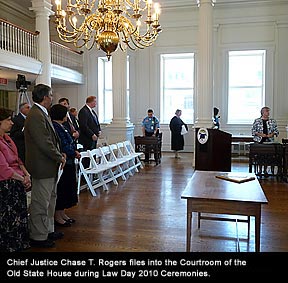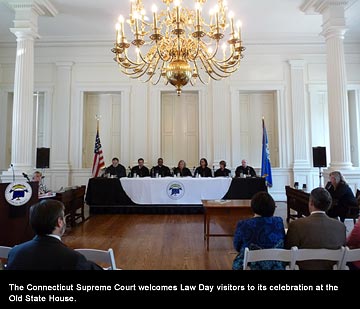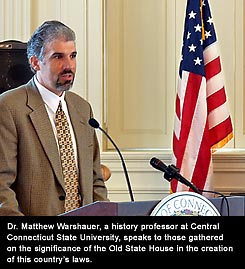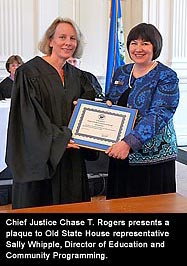|
HARTFORD,
May 26, 2010—Its surroundings have changed
but the building remains the same. The Old State
House, the one-time center of all things
governmental, political and judicial in
Connecticut, stands amid traffic islands and
high rises, its brick exterior a testament to
its historic past.
Throughout its 214-year
history, a state was run from here and laws
passed; dignitaries from home and afar spoke
here—including the
 Marquis
de Lafayette, General Philip Henry Sheridan and
President Andrew Johnson. And, from 1796 to
1878, the Connecticut Supreme Court heard cases
there. Marquis
de Lafayette, General Philip Henry Sheridan and
President Andrew Johnson. And, from 1796 to
1878, the Connecticut Supreme Court heard cases
there.
That’s why the Connecticut
Supreme Court decided to hear cases in the Old
State House courtroom to celebrate Law Day and
its 2010 theme, Law in the 21st
Century: Enduring Traditions, Emerging
Challenges.
“This building holds a
special place not just in the Hartford community
but in our state history and certainly the
history of the Connecticut Supreme Court,” said
Chief Justice Chase T. Rogers. “Thanks to their
stewardship, the Court has now been in session
in this courtroom at least once for each of the
last four centuries. We hope that tradition will
continue for centuries to come.”
Following the morning’s
cases, the Justices adjourned for lunch and then
returned for a very special program that honored
the events of the past and looked forward to
those of the future.
 “Law
Day has become an annual opportunity to enhance
public knowledge of our justice system as we
honor the freedoms that we, as Americans,
enjoy,” said Chief Justice Rogers. “This year’s
Law Day theme, Law in the 21st
Century: Enduring Traditions, Emerging
Challenges presents a perfect opportunity to
learn about—and celebrate—some Connecticut
traditions.” “Law
Day has become an annual opportunity to enhance
public knowledge of our justice system as we
honor the freedoms that we, as Americans,
enjoy,” said Chief Justice Rogers. “This year’s
Law Day theme, Law in the 21st
Century: Enduring Traditions, Emerging
Challenges presents a perfect opportunity to
learn about—and celebrate—some Connecticut
traditions.”
To enumerate the Old State
House and its place in American History, Dr.
Matthew Warshauer, Professor of History at
Central Connecticut State University, was asked
to address the Law Day gathering.
“Today we are standing on
historical ground in an historical city,” said
Dr. Warshauer. “Whenever I come into this
building—now granted I am an historian and
somewhat a history geek—I always
 feel
a sense of being in a special place, walking
where people have walked before me who have been
the center of our State, the center of our
political system, the center of our Legislature,
the center of our Judicial Branch. feel
a sense of being in a special place, walking
where people have walked before me who have been
the center of our State, the center of our
political system, the center of our Legislature,
the center of our Judicial Branch.
“These are the
people—sometimes for good or bad—who have led
our state and led our nation into the future,”
he added. “I would argue that much of the
history of our country comes back to this place
that we are sitting in today.”
Though clearly in awe of
the building and its past, Warshauer went on to
explain that it also stands as a beacon for
upholding the Constitution.
“Since the founding of this
nation, before the ink was dry on The
Declaration of Independence, before the ink
was dry on our Constitution there were
disputes about what the documents meant and
where they would lead us and what the role of government—either Federal or State—was in the
lives of our citizens.
of government—either Federal or State—was in the
lives of our citizens.
“These are arguments that have
been around since the founding of our Republic,”
he added, “and one of the things that the
Founders constantly reminded us of is to remain
vigilant as citizens—to keep our eyes on the
government, keep our eyes on the law and abide
by the law—this was one of the most important
things that separated us from other nations and
their systems of government.”
Following Dr. Warshauer’s
speech, Attorney Francis J. Brady, President of
the Connecticut Bar Association, spoke to the
future of law.
Following their remarks,
 Chief
Justice Rogers presented a plaque which read:
In recognition of the Members of the Board of
Directors and staff of the Old State House for
your efforts to preserve the Old State House and
its place in the community, so that future
generations may benefit from its legacy. Chief
Justice Rogers presented a plaque which read:
In recognition of the Members of the Board of
Directors and staff of the Old State House for
your efforts to preserve the Old State House and
its place in the community, so that future
generations may benefit from its legacy.
She then presented the
plaque to Sally Whipple, Director of Education
and Community Programming for the Old State
House.
After the presentation,
Chief Justice Rogers ordered the ceremony
adjourned and the Supreme Court
Justices—following in the footsteps of
history—filed out of the Old State House.
|



